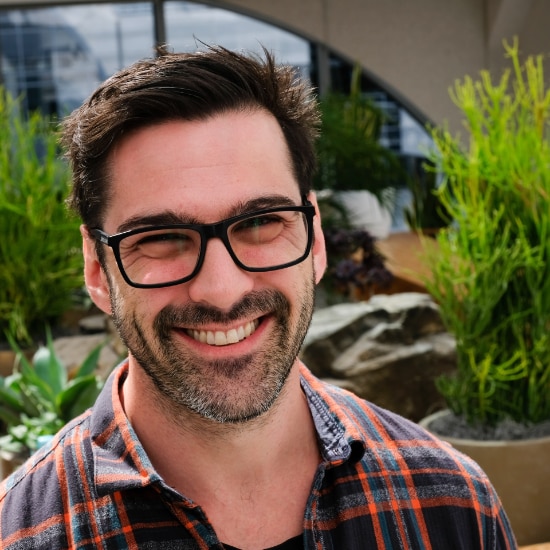Day 1
- September 4
- 11am–2:30pm AEST
Fugu and the Future of the Web Platform
Kenneth Rohde Christiansen, Sr. Web Platform Architect Intel Corporation
Progressive Web Apps–Web sites that can progressively turn into app like experiences and be installed on your devices–were introduced to the world at this very conference in 2015, by Alex Russell.
PWAs now also work on desktop systems, but usually desktop applications have different requirements as they are usually used for creating, in contract to consumption on mobile. As a user you want to be able to access your files, copy paste without issues, not having the screen turn off while giving a presentation, you want access to printers and other devices, access to local fonts. The list goes on! Currently most of those things are only available to native apps and are not things you want your random web sites to have access to. Project Fugu is the project to extend the web with more native like capabilities in a way that is safe and understood by the users. Join this talk to learn more about the exciting things we are working on as part of Project Fugu.
The Web in the age of Surveillance Capitalism
Marcos Caceres, Standards Engineer Mozilla
Although early web standards forewarned of the privacy risk of technologies like cookies, they never envisioned that the Web Platform would be coopted for global-scale mass surveillance. In response, browser vendors have been working together to clamp down on the most egregious privacy abuses.
In this talk, Marcos will discuss breaking changes and new APIs that will help make the web platform more private and secure, and what these changes will mean for you as a developer and user going forward.
QA with Kenneth Rohde Christiansen and Marcos Caceres
Join in a conversation with our speakers to discuss their presentations and more.
Break time
Refreshment break,
Time for a quick break for a cup of coffee or tea. Chat to fellow attendees and speakers. Or visit one of our fantastic partners.
Better Payments for the Web with the Payments API
Eiji Kitamura, Developer Advocate Google
In recent years the Web Platform has gained many of the capabilities that had been exclusively the preserve of native applications. But one area in which the Web has continued to lag is in the area of payments.
Enter the Payment Request API a way for browsers to manage the user's experience of paying for things on the Web, and making this faster and more consistent for users and merchants alike.
In this session, Eiji Kitamura from Google Web Developer Relations team shows us what the payments API is for and how to use it to make the experience of paying for things on the Web much more pleasant.
Say Goodbye to Passwords and Hello to WebAuthn
Ben Dechrai, Developer Advocate Auth0
Identifying ourself to access social media, banking details, and every aspect of our online life is something we do potentially dozens of times a day.
But as the nearly ten billion leaked account details documented by "';--have i been pwned?" attest, this process has a fatal weakness–passwords.
The Web Authentication API (or WebAuthn) is a standard from the W3C and FIDO tjat "allows servers to register and authenticate users using public key cryptography instead of a password". WebAuthn is part of a set of standards that enable passwordless authentication between servers, browsers, and authenticators. It's supported in all modern browsers.
In this presentation Ben Dechrai will outline how the technologies work, and how you can take advantage of them today to create a far more secure experience for your users.
QA with Eiji Kitamura and Ben Dechrai
Refreshment break,
Need a quick breather? Or why not share your thoughts with others attending? We'll be back soon.
The Origin Trials
Phil Nash, Developer Evangelist Twilio
Young adult, dystopian thriller or the future of the web? Origin trials are one of the methods that browsers experiment with new web technologies and you should know about them. Being aware of the experiments and taking part in the ones important to you gives you a voice in the future of the web platform.
In this talk we'll explore what an origin trial is, how you can take part, and what is currently being experimented with on the web. Vigilance is key to protect the web from a potential future dystopia.
The State of Web Components
Ana Cidre, Developer Advocate Auth0
A decade in the making, Web Components, a standardized set of technologies allowing us to allowing to create reusable custom elements are now widely supported in modern browsers.
In this presentation Ana Cidre will take a look at the overall architecture and some common use cases and patterns to get you started now Web Components are a viable option.
QA with Phil Nash and Ana Cidre
Day 2
- September 11
- 11am–2:30pm AEST
The State of JavaScript
Houssein Djirdeh, Developer Advocate Google
How are we actually using JavaScript today? Which features are widely adopted, and which less so? What performance impacts is JavaScript really having on page load times?
In this presentation Houssein Djirdeh details how we're really using JavaScript today.
ECMeowScript–what's new in JavaScript explained by cats
Tomomi Imura, Software Engineer
While not quite the bumper update of 2015, the most recent iteration of JavaScript, ES2020 features a number of new language features, small and large. From the ability to handle very large integers, to additions to asynchronous JavaScript, to a myriad of cleanups and refinements of the language.
In this presentation, Open Web advocate and front-end engineer Tomomi Imura gets us up to speed with the latest iteration of JavaScript, with a little whimsy, because we could all use a bit of that right now.
QA with Houssein Djirdeh and Tomomi Imura
Join in a conversation with our speakers to discuss their presentations and more.
Refreshment break
Need a quick breather? Or why not share your thoughts with others attending? We'll be back soon.
Asynchronous and Synchronous JavaScript. There and back again.
Maciej Treder, Senior Software Development Engineer Akamai Technologies
Callbacks… Callbacks everywhere… Callback inside the callback, and one more inside! Asynchronous JavaScript code is a pain. Event loop is a JavaScript “bigfoot” - everyone heard about it, almost nobody knows how it works… There is multiple ways you can deal with the asynchronous action: callbacks, Promises, Observables, async-await; but which one is best? Which one should you choose for the particular scenarios?
JavaScript debugging the hard way
Marcin Szczepanski, Principal Developer Atlassian
Error on line 1, column 6532112 of bundle.js? Out of memory error trying to load a CPU profile into the Chrome debugger? Two minutes to see wait and see if a change you made fixed a bug?
While upgrading our complex web application from Webpack 3 to Webpack 4, we ran into these of challenges and more, that required adapting my use of debugging tools and techniques to deal with the scale of the problem.
As your codebase grows the debugging techniques you apply need to adapt - things you take for granted like setting a quick breakpoint, reproducing a bug in seconds, or loading a CPU profile into the Chrome Dev Tools start to break down.
This talk dives into the different issues we encountered, and how we debugged and fixed them - providing practical examples, and tips, for debugging JavaScript in the Browser and Node as your codebase grows, that provide a valuable addition to any developer's toolbox.
QA with Maciej Treder and Marcin Szczepanski
Join in a conversation with our speakers to discuss their presentations and more.
Break time
Time for a quick break for a cup of coffee or tea. Chat to fellow attendees and speakers. Or visit one of our fantastic partners.
Native JavaScript Modules
Mejin Leechor, Software Engineer VMWare
A decade (or more) in the making, JavaScript modules are now supported in all major browsers and in Node.js. So now theres a widely supported, standardized way of modularizing your JavaScrpt.
In this presentation Mejin Leechor will show us how they work, and why you should be using them.
Specifying JavaScript
Yulia Startsev, Developer Mozilla
A language like JavaScript, with a large diverse user space, is half designed, and half reverse engineered. Like all web standards, JavaScript is developed in conjunction with the realities of the web and user decisions in how the language is used and formed.
This results in unique backwards compatibility issues such as the recent smooshGate discussion. These cannot be ignored in the standardization process, even when better alternatives exist. This talk will discuss
constraints, mediation strategies and issues that have arisen from the proposal process introduced by the TC39, and the unique challenge of introducing formalist methods to a language that has been developed in such a
manner.
QA with Mejin Leechor and Yulia Startsev
Join in a conversation with our speakers to discuss their presentations and more.
Day 3
- September 18
- 11am–2:30pm AEST
Day 4
- September 25
- 11am–2:30pm AEST
Our venue
hover 2021 will take place across 2 Fridays in March/April wherever it's most convenient for you.
Getting there:
Get out of bed, make a coffee, wander to your desk, and start right in. Or just watch from the comfort of your bed. If conditions allow watch in your office, or grab a team pass and watch together as a team.
No expensive flights, or long commutes, be part of it wherever you feel like.
Accommodation:
No need for hotel rooms or airbnbs!
Partners
We work closely with our partners and their technologies to deliver world leading online conferences.
Contact us for more on how we work can work with you to help you be even more awesome.
Praise for past Web Directions events

Web Directions is the must-attend event of the year for anyone serious about web development.
Phil Whitehouse,
Innovation Lead DigitasLBi

I’ve been admiring the Web Directions events for years, and was honored to be part… What a fantastic event!
Ethan Marcotte,
inventor "responsive Web design"

Out of any conference, Web Directions is far and away our favourite
Dave Greiner,
founder Campaign Monitor
About Us
Co-founded and now run by John Allsopp, Web Directions has for nearly 20 years brought together leading developers, engineers, visual, IxD, UX and product designers, Art and Creative Directors, product managers indeed everyone involved in producing web and digital products to learn from one another, and the World's leading experts across this vast field.
We spend our lives thinking about what comes next, keeping up with trends in technology, practices and processes, and filtering the hype, to make sure you don't miss trends that matter, and don't waste time on hype that doesn't.
We promise attending one of our events will leave you significantly better versed in the challenges you face day to day, and in solutions for addressing them.

John Allsopp
John Allsopp has been working on the Web for nearly 30 years. He's been responsible for innovative developer tools such as Style Master, X-Ray and many more. He's spoken at numerous conferences around the World and delivered dozens of workshops in that time as well.
His writing includes two books, including Developing With Web Standards and countless articles and tutorials in print and online publications.
His "A Dao of Web Design" published in 2000 is cited by Ethan Marcotte as a key influence in the development of Responsive Web Design, who's acclaimed article in 2010 begins by quoting John in detail, and by Jeremy Keith as "a manifesto for anyone working on the Web".
Code of Conduct
For over a decade, we've worked hard to create inclusive, fun, inspring and safe events for the Web Industry.
As part of our commitment to these values, we've adopted a code of conduct for all involved: ourselves, our speakers, our partners and our audience.
If you have any concern or feedback, please don't hesitate to contact us.










